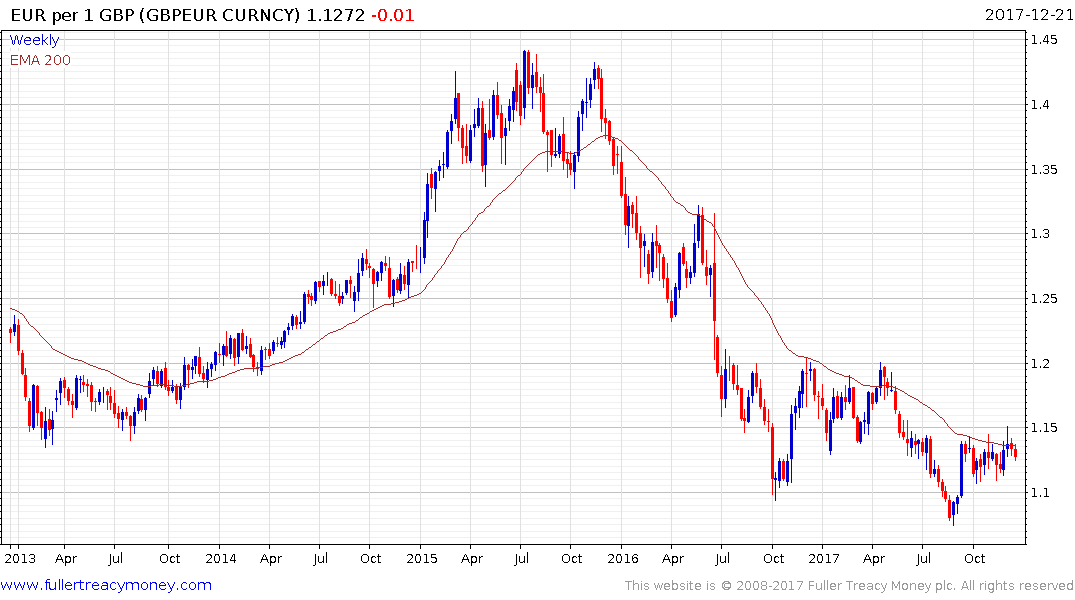Switzerland Says the EU Is Trying to Weaken Its Financial Center
This article by Catherine Bosley for Bloomberg may be of interest to subscribers. Here is a section:
“Switzerland fulfills the conditions for recognition of stock market equivalence every bit as much as the other third countries that have been granted indefinite recognition,”
Leuthard said at a press conference in Bern on Thursday. “The government has the impression that this decision by the European Union is intended to weaken Switzerland’s financial sector.”
The European Commission, the EU’s executive arm, on Thursday formally adopted the decision finding Switzerland’s regulations sufficient to allow EU market participants to continue trading on Swiss exchanges for a year, after markets trading directive MiFID II comes into force on Jan. 3. The Commission said that given the amount of cross border stock trading with Switzerland, the ramifications of the decision were greater than in the case of the U.S., Hong Kong and Australia.
Switzerland’s financial sector contributed 9.1 percent to economic output last year, a higher share than in the U.K. or Germany. The city of Zurich -- home of UBS Group AG and Credit Suisse Group AG -- is the highest ranked financial center in continental Europe, according to the Global Financial Centers Index.
The Swiss government said it doubts the EU’s decision is legal and that it was beginning work immediately to shore up the stock exchange and financial industry. The Finance Ministry has until the end of January to come up with detailed proposals, including abolishing stamp duty on securities transactions, Leuthard said.
The EU is a major global economic grouping that does not have a significant financial centre. After Brexit, London will join Zurich outside the currency union. That represents quite a challenge for the Eurozone because it will be left without a major financial hub.
Deutsche Bank was the only Eurozone bank that had real aspirations of becoming a truly global investment bank and the effort nearly caused the firm’s demise. Meanwhile Banco Santander and BBVA are the only banks in the Eurozone that make more money outside the bloc than inside; thanks to their exposure to Latin America. However, neither is considered a globally significant investment bank. That absence represents a hole in the skill set available within the European Union from a legal, administrative, financial, risk management, asset management and derivatives perspective that is difficult to replicate.
The Eurozone is already dependent on energy imports and with Brexit it will become dependent on outsiders for financial services. From within Brussels there must be some discussion about what the national security issues are relating to both conditions.
The drive toward renewables within Europe is well established and, while expensive, can be justified as a means to creating a domestic energy generation sector. If that is the case with energy could it also be the case with finance? Is the EU willing to tolerate a less efficient structure in order to foster a domestic banking structure dependent on Eurozone cohesion? Considering how much of a burden the financial sector has been through, with sovereigns absorbing private debts, there is probably not much enthusiasm for building a strong imaginative financial corpus within the bloc.
These are major questions for the UK as it approaches Brexit negotiations where a Canada-like agreement is being offered which excludes financial services. This article by Anatole Kaletsky highlights a point I have made previously that the so-called transition agreement could well go on for much longer than the initially anticipated 2 years. Here is a section:
What, then, will happen at the end of the transition period in April 2021? The only plausible answer is a further transition, if only to avoid an economically devastating rupture in trade regulations just before the UK general election due in 2022. And, assuming the transition is extended from 2021 to, say, 2023, aren’t further extensions likely, probably evolving into a quasi-permanent arrangement? Norway’s EU relationship via the European Economic Area, also designed as a brief transition, has now lasted 24 years.
This “Hotel California” scenario, in which “you can check out any time you like, but you can never leave,” would ultimately enrage both Brexiteers and Remainers. So what are the other options?
If a hard Brexit is economically unacceptable to British business and Parliament, a soft Brexit is politically unacceptable to EU leaders, and a fake Brexit is unacceptable to almost everyone, that leaves just one alternative: no Brexit.
The creeping realization that this is a possibility suggests the potential for political upheaval is high. Theresa May is walking away today with support from the new Polish administration but her position is only tenable as long as no one else can see value in taking the job. If the Brexit argument comes back down to a question of conscience rather than politics then the potential for a snap election based on principle rather that political advantage is a non-trivial risk.

The Pound/Euro exchange rate is a handy barometer of the perception of how well the UK is likely to do from the negotiations. It has paused in the region of the trend mean over the last couple of weeks but a sustained move above it will be required to reassert medium-term Pound dominance.

The FTSE-350 Banks Index has been rangebound this year and is now testing the upper side. A clear downward dynamic will be required to question current scope for a successful break.

The Euro Stoxx Banks Index has also been ranging below 150 this year and is firming from the region of the trend mean at present.

The Swiss Banks Index broke successfully above 600 in October and reasserted its uptrend in December. While somewhat overbought in the short-term, a sustained move back below 600 would be required to question medium-term scope for continued higher to lateral ranging.


